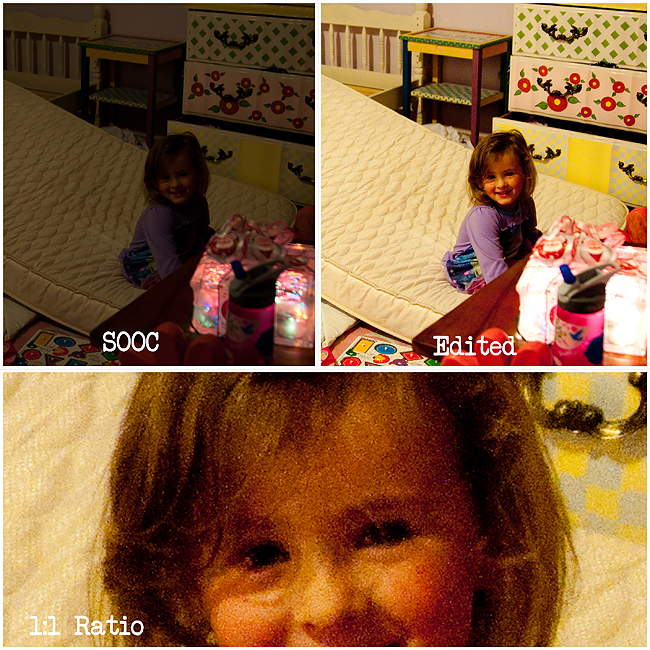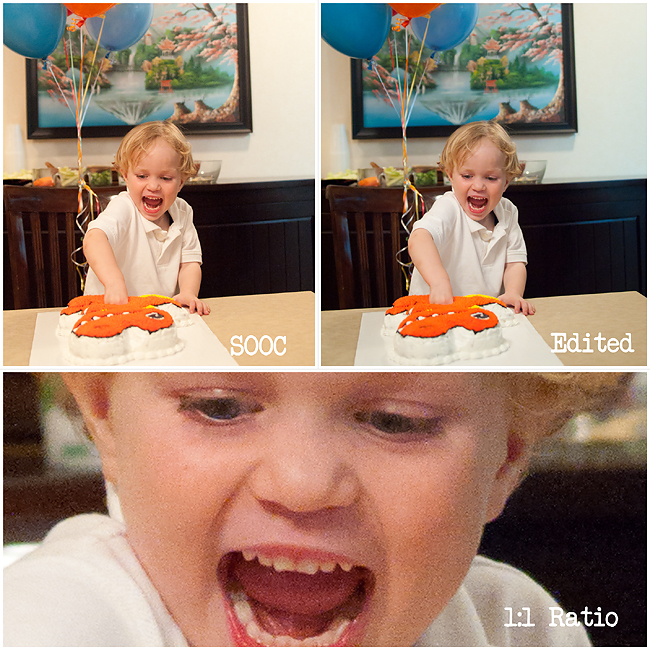If you remember anything from this lesson remember this –
Don’t be afraid to raise your ISO!
We talked about what noise looks like in photos last time we talked about ISO. Since then several people have said they don’t like to raise their ISO. If your photo is properly exposed there is no reason to be scared of raising your ISO. Since Christmas is this week and we will have a lot of opportunities to take photos in low lighting situations I just want to remind you to raise your ISO! Please don’t rely on post-processing to lighten up your photo.
I used to be so scared to raise my ISO because I thought my picture would be super noisy and look awful. Therefore, I would only raise it a little and my photo would still be underexposed, which would come out grainy. This only reinforced my thinking that raising my ISO was bad. What I didn’t realize was if I had raised it as high as it needed it to be the photo would not have turned out as awful.
We put our kiddos to bed at 7:30 but for some reason she decided that instead of sleeping this would be a great way to spend her evening. Of course, I was really upset but I had to capture the moment first. I should have raised my ISO even higher but I was in a hurry since I was trying to keep my “I’m mad” Mom face. Notice how dark the details are even after I attempted to brighten it up in post-processing.
ISO 800
This photo was taken at ISO 5000 and looks so much better. Don’t be afraid to raise your ISO!
ISO 5000
If you want see how to reduce your noise in Lightroom check out this video – Noise Reduction Lightroom Video.








Thank you for this. I was wondering why sometimes the higher ISO looked better but I have been afraid to raise it even on my new D700.
First off, super jealous of your D700!! :O) You should definitely not be afraid to raise your ISO with that wonderful camera :O)
Funny- I was just reading about this in a book, and I got to try it out tonight when I went out at 3am to take pictures of the lunar eclipse. The moon was quite reddish, which meant a longer shutter speed (about 10 seconds at 600mm focal length), but because the moon is always moving the pictures weren’t as clear as I had hoped. I upped the ISO to 1600, and was able to knock the exposure down to 4 seconds! So long story short- I agree! Don’t be afraid to up the ISO!
Yay! I’m glad you were able to capture the lunar eclipse! I would LOVE to see the photo you captured :O)
Its nothing amazing, still some blur even with 4-6 second exposures. I found the 6 second exposures seemed to be the best, unfortunately, there is a tad bit of noise from the ISO 1600.
The pictures are on my blog:
http://www.sewin2disney.wordpress.com
Awesome, I will have to head over there to check it out :O)
I’m super scared to rise my ISO above 800. I see noise after that. Most people might not notice it, but I know it’s there and it drives me CRAZY!!! Maybe I’ll give it another try though…
Do you ever use noiseware? I thought I liked it (the free edition) until I realized it shrunk my files considerably!
Yes, noise will be there when you raise your ISO but it is better to have a properly exposed picture and a little noise though :O) I have not tried noiseware. I have Lightroom 3 which is able to do some noise reduction. I have been really pleased with the results and I haven’t noticed that it shrinks my images. Good luck :O)
Do you have a post about using noise reduction in lightroom? I use LR4 and would love to know how best to accomplish it! I have a Nikon D40X and I feel like I get so much noise in my photos over 800. This post is a great challenge for me!!!! :) Thanks for all your wonderful work on your blog. I’m just going through the 100 posts for newbies and its great!
Just found the noise reduction video! Thanks!
:)
Glad you found it. I’ll put a link to it on this page to help others. Thanks!
thank you for all your wonderful posts.
I really love them. you have an awesome way for giving instructions. so simple and easy. that is the way i like it.
will there be more posts about how to edit your photos to look better?
I have a question. When I record video on my d5100 it seems like I get a lot of grainy pictures. I’m not sure if it has something to do with the kit lens that I’m using or if I’m not properly setting the camera to the right ISO and everything. I’ve watched other video’s taken with this camera and I can’t seem to get as sharp as a picture with I go to edit it. Is there a certain software you would recommend to use and also how can I get the grainy look out of my video?
Oh, I wish I could help! Unfortunately, I don’t know anything about the video aspect of the D5100. I’m sorry! Good luck!! My guess is that it has to do with the lighting you have available.
Hi Courtney,
I am new to your website and have already started to like the information up here, I have just started photography with a canon Rebel X t2i with a kit lens 18-55 and a 55-250.
I like wildlife photography and in my last trip with an ISO of 800 itself that grains were too high, and it was all over the place. If I need to clean up that image what can I do because if I sharpen the image its going to worsten the image and if I add luminance to it it will not show the texture and details.
Can you shed some light on this?
That is tough. If you have a lot of grain at ISO 800 consider raising it even higher. I know that sounds crazy but remember, it is more important to have a properly exposed image. Also, consider shooting a little more wide open with your aperture to let in more light. Good luck!
Hello, I am the one who was bugging you on facebook. Sorry to be a pest. First, I want to say that I love your newsletters. I have learned so much. I read this article and this was exactly the problem I was having . I edit in photoshop and I tried to lessen the noise in my photos and it added a little blur to the photo. Is this normal?
You aren’t a pest :) That is odd that it added blur. Do you mean it gives you photos like a plastic look to their skin? Check out this video…maybe this will help – http://clickitupanotch.com/2010/10/lightroom-noise-reduction-video/
First, I would like to say thank you for your website. My friend just shared the link with me a couple weeks ago. Most people would use their knowledge to sell a class, but I love that you are so generous with this information and show so many examples.
Anyway, I have a D5100. I have tried to turn my ISO up all the way (6400) for low light setting and not only were the pictures still dim, but SUPER grainy. I’m assuming you have info to fix that on the website, but it has been frustrating because the quality is so crappy on otherwise great shots.
Hey Melinda!
Thanks and tell your friend thanks for telling you about my site. Yes, it may be grainy especially if it isn’t properly exposed. Here is how I fix it in Lightroom – http://clickitupanotch.com/2010/10/lightroom-noise-reduction-video/
I have a Nikon P520 and, when I raised my ISO to 3200 and then to 1600 and both of them turned out TOO, TOO, TOO bright. I put it back to 400, where it was, and I have a perfect picture…..
I just wanted to comment that while I agree about not being afraid to raise that ISO I also encourage people to really know the limits of their camera concerning this. Lower end and entry level cameras do NOT do well in higher ISO’s. (i’m talking 1600 and above) Don’t compare that iso to that of a higher camera when they are shooting 3200 and more.
So don’t be afraid, but don’t “test” that theory in the middle of an important shoot. :)
Keeping a low ISO is still preferred but if you want to do this in low lighting then it needs to be compensated by lowering the aperture and shutter speed. If it is really dark then that usually means having to use a tripod to get the best quality image possible. Of course for quick photo opportunities, and especially when children or animals are involved, your subjects are not going to wait around while you set up a tripod and get ready to shoot, in which case hand holding the camera is important and raising the ISO is the better way to get a properly exposed image with the least noise.
Do you have any sections of your site or site recommendations to those of us who prefer to expose negatives instead of a sensor? I’m shooting mostly B&W.
I don’t. I hope you are having to find the information you are looking for.
cheap jersey sheets cheap jerseys onn sale